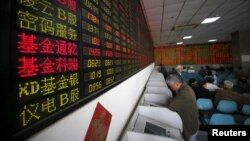A surge of volatility in China's once placid commodities futures markets has rattled industrial players who use them for hedging, with some taking losses or cutting exposure, driven out by a flood of speculative money from hedge funds and retail investors.
A herd of financial investors charged into commodities futures markets this year, throwing money into iron ore, rebar, cotton, and even egg futures, causing rapid spikes and leading many to warn of similarities with last year's boom and bust in Chinese stocks.
Rebar futures, for example, are up more than 50 percent so far in 2016 after six straight years of losses, and on Thursday last week the turnover for a single contract on the Shanghai Futures Exchange was worth nearly 50 percent more than the total value traded on the Shanghai Stock Exchange that day.
On some days trade in iron ore futures, which are up 57 percent this year on the Dalian Commodity Exchange, exceeded China's total imports for 2015.
Concerned about the impact, the major exchanges have already moved to curb these speculative flows by increasing the cost of trading, with Dalian announcing on Wednesday its fourth increase in a week on transaction fees for coking coal and coke futures.
But the market frenzy has already made it too risky for some industrial companies to use the futures markets to even out price fluctuations.
"Many steel mills have lost a lot of money as they didn't expect the spike in futures and took short positions at the end of last year," said an executive at a state-owned steel mill.
"Mills can't afford big volatilities. We have decided to get out of the futures market for now," he said, adding that some of his peers had also cut their exposure to the market.
Some analysts speculated the surge was prompted by China's improved economic performance in the first quarter, combined with plans for more infrastructure investment.
Others argued that commodities futures were the only place speculators — mostly hedge funds accompanied by a swarm of small retail players - saw the possibility of making quick money, given weakness in stocks, bonds and housing markets. By the end of February, assets under management by futures companies grew sevenfold from a year ago, to 142.1 billion yuan
($21.9 billion), the Securities Times reported on Tuesday, citing a senior official at the China Securities Regulatory Commission.





